If you've been concerned about a stock market crash in 2022, you aren't alone.
With inflation running at the highest levels since 1987 this year, the Reserve Bank of Australia has raised interest rates for eight consecutive months since May. Yesterday's rate hike brought the official cash rate to 3.10%.
That's put pressure on stocks as higher interest rates translate to higher cash deposits and government bond yields, both of which carry less risk. Many stocks are also dealing with debt payments, with higher rates increasing their costs.
Fortunately, a full blown stock market crash didn't eventuate. But there were times it sure looked like it was about to.
From late April through late June, the S&P/ASX 200 Index (ASX: XJO) fell by more than 15%.
But this turned out to be little more than a correction. Rather than capitulate, investors saw it as a buying opportunity.
Today the ASX 200 is up more than 12% from the 20 June lows.
Could the stock market crash in 2023?
We're certainly not hoping for a stock market crash next year. Or any year.
And judging by the resilience of the ASX 200 this year, the index could well surprise to the upside in 2023.
But there are some headwinds from 2022 that will carry over into the new year.
As RBA governor Philip Lowe pointed out yesterday, inflation is likely to remain above the central bank's target rate into 2024. And he indicated that additional rate hikes will be coming in 2023.
Lowe also said the Aussie economy remains in strong shape, but he expects a slowdown next year. Should higher rates slow growth into the negative, the resulting recession could be the trigger for a stock market crash.
Commenting on the outlook for United States equity markets if the American economy is hit by a recession, David Bailin, chief investment officer at Citi Global Wealth said (quoted by Bloomberg):
Markets have never bottomed before a recession has begun. If there is in fact going to be a recession next year, if we are going to see a period of unemployment rising in the country, then we would expect that markets would have to settle down from where they are today over the course of the next several months.
Then there's Russia's ongoing war with Ukraine. We hope to see a peaceful end to the conflict in 2023. But hopes aside, things could go the other way, with the war escalating and drawing in NATO allies. That too could see the stock market crash.
How I'd take advantage
Firstly, don't go losing sleep worrying about a stock market crash in 2023.
And don't panic sell your shares or stop looking for long-term investment opportunities to grow your wealth.
The future, by definition, is unknown.
The ASX 200 is quite likely to see some big moves lower next year, as well as some big moves higher.
But looking back on 2023 in a decade, history would indicate that any retrace, even a full blown share market crash, will likely be little more than a dip in the price charts.
With that said, the most opportune time to buy shares is when they've just sold off heavily.
Now, timing the market perfectly is essentially impossible. But getting in even near the lows on either end of a stock market crash would offer the chance to buy a range of quality stocks at an extreme discount.
That's why I'm planning to increase my cash holdings over the coming months, to make sure I have plenty of powder dry to take advantage of any outsized market falls.
Not that I won't keep an eye out for choice investment opportunities in the meantime. If you know where to look, there are always some promising potential ASX shares to help grow your wealth.









